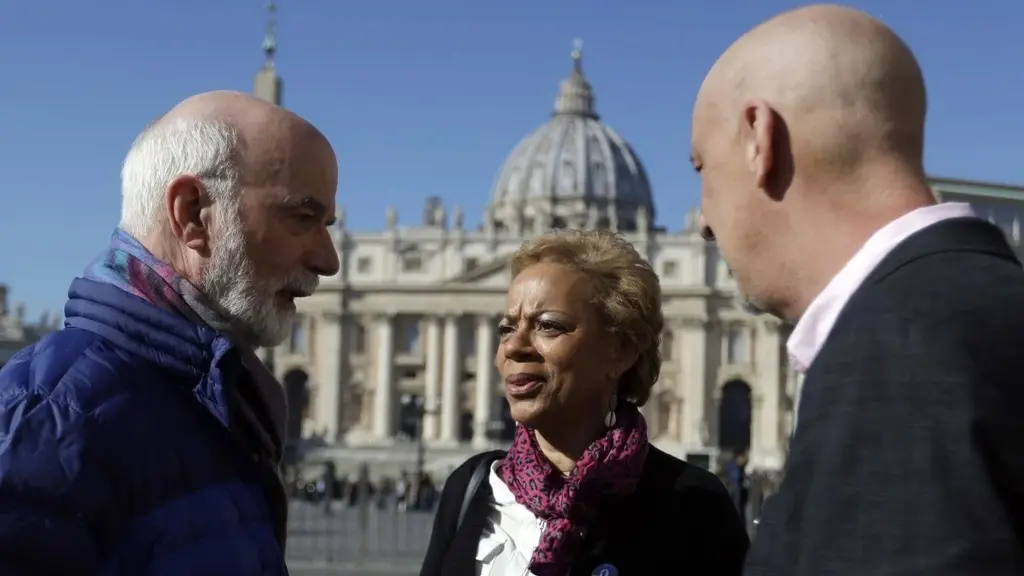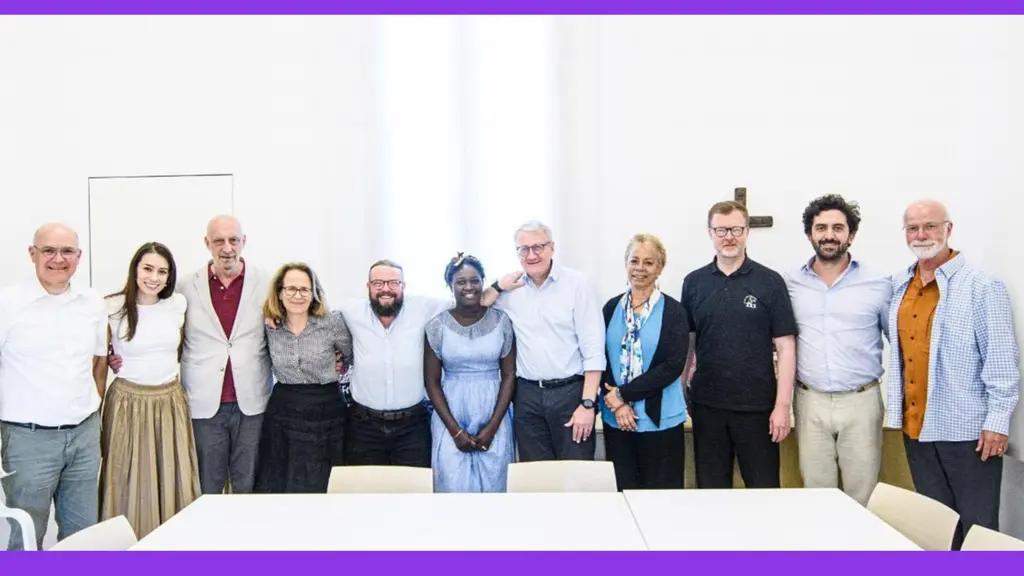
I'm one of the founding members of Ending Clergy Abuse (ECA). It's a voluntarily-led global justice project present in five continents and 23 countries. Our mission is to put an end to the systems that allow violence against children in faith-based institutions, especially in the Catholic Church.
The Vatican City is the spiritual and administrative center of the Roman Catholic Church, where the Pope is the head of state. Vatican City is also the world's smallest country, both by area and population, occupying an area of 0.4 square kilometers. Yet this small country has power over all of the 1.4 billion Catholics in the world. The Church is governed by Canon Law, which regulates the church's internal administration and hierarchy.
Calling for legislative and policy reform at the global level
Our role at ECA has been to examine and advocate for the reform of the laws within the Church that have allowed the sexual abuse of hundreds of thousands of children and perpetuated the cover-up of those crimes.

In 2014, the United Nations Convention on the Rights of the Child issued a series of recommendations to the Vatican to ensure the safety of children who are part of the Catholic Church:
- Canon Law reform.
- An independent mechanism for monitoring children's rights and the conduct of the Catholic hierarchy in managing sexual abuse.
- Transparent sharing of archives related to the management of sexual abuse
- Immediate removal of perpetrators of child sexual abuse from the Ministry.
This call by the UN was echoed by other international bodies and governments from around the world. That same year the United Nations Convention Against Torture issued a report calling for effective monitoring of any suspected abusers, with penalties including dismissal from clerical service for abusers. Multiple countries have issued reports following widespread investigations into sexual abuse in the Catholic Church, including Australia, France, England, and Wales. Many have recommended a reclassification of abuse as a Canonical crime against a child, rather than a breach of celibacy.
"ECA has presented several horrendous cases of clergy sexual abuse to both committees at the United Nations, including the Provalo case in Argentina involving the abuse of deaf and mute children. The Vatican was expected to give its national report to the United Nations in 2017. We are all still waiting."
A reason for hope
However, there is some hope. This year, ECA has been able to form a historic collaboration with the Catholic Church's top anti-abuse experts and with Canon Law lawyers to craft a zero-tolerance law for the protection of children.

Currently, sexual abuse by clergy is viewed in Canon Law as a violation of the Sixth Commandment, “Thou shalt not commit adultery”. But we know that what happened to survivors of clergy sexual abuse like myself was a crime against our dignity and not adultery, which implies consent. Instead, the zero-tolerance law we’re crafting identifies sexual abuse as a grave crime against the life, dignity, and freedom of victims.
To ensure the effective application of this law there must be:
- A public declaration by the Head of the Catholic Church in which he promises both to apply the zero-tolerance law consistently without exception and to release sufficient information to demonstrate compliance.
- A guarantee of an independent compliance agency be set up – additionally, we're recommending a survivor network – to investigate, document, and publicly identify persons of authority in the Church who contributed through their negligence or intentional acts to conceal abusive priests.
While we propose that the zero tolerance law be universally binding, we understand that its implementation may be culturally adapted to reflect the diverse cultural customs, values, and beliefs across the world's populations that the Catholic Church serves.
"We feel strongly that once the Catholic Church adopts a zero-tolerance law, other faith institutions will follow suit. Crucially, when developing new legislation and policy to end childhood sexual violence, survivor inclusion is vital to ensure these are fit for purpose."
This was so clearly highlighted in the recent Conference at the Council of Europe’s Fight Against Child Abuse in Institutions in Europe. On 26 January 2024, the Parliamentary Assembly of the Council of Europe (PACE) took a historic step by calling for the recognition of abuse in institutions across Europe (Resolution 2533).
This decision emphasized the need for comprehensive reparation for all forms of violence against children, including sexual abuse, physical violence, and mistreatment in public, private, and religious institutions. Over 22,285 victims and survivors from all over the world shared their experiences through the Global Our Voice Survivor Survey, which contributed to the case for this landmark decision.
It takes all of us to create safe environments for our children, in churches or any other spaces. Leaders won’t hold themselves to account. That is our mandate that I invite you to take on.
More like this

What does it really mean to be child-centered and trauma-informed?
There is no limit to the long-lasting impacts of online child sex abuse. Though significant efforts have been made globally to enact legislation on online child sexual abuse material, the meaningful integration of survivors’ lived experiences is critical to creating a holistic approach to end this global scourge. I was a victim of technology-assisted child sexual abuse when I was 13. I was manipulated into sending one topless image, and that image was used to blackmail me for more images, more videos, and then for my address, the perpetrator came to my home the following morning and committed sexual violence in person, and took more images. An example of a great solution to address technology-facilitated childhood sexual violence is the Model National Response by the WeProtect Global Alliance , in partnership with UNICEF. Some of those officers didn't understand that if you are the officer that's seen that child's image, then that child is not going to talk to you. So we helped them to implement a simple solution: If you've not seen that image, you tell the child upfront, “Don't worry, I've not seen it.” If you have seen it, then you do not speak to that child and instead another officer will conduct the conversation. A resource was also created specifically for those children who are identified in child sexual abuse images. We have seen children being blamed for taking an image consensually and sharing that with their boyfriend or girlfriend. However, we’ve seen children who have been threatened with criminalisation for those images. The Model National Response guides the coordination of national efforts that is critical in delivering a holistic response to online child sexual exploitation and abuse. However, challenges have included private sector participation, weak governance bodies, limited political will to address online child sexual exploitation and abuse, and an entrenched, artificial divide between online and offline child sexual exploitation and abuse.

In our hands: ending violence against children through multi-sectoral prevention and early intervention support services
I am a psychoneurologist, human rights consultant, and one of the founding members of ECA: Ending Clergy Abuse.ECA is a volunteer-led global justice project that has grown over the last 7 years across 5 continents. We have members in 23 countries, with the largest concentration in Latin America. Our mission is to end the systems that allow child violence to persist in faith-based institutions, especially in the Catholic Church.

Safety education is the most powerful safeguard for children
I am a survivor, a child protection advocate, and a children’s book author from Kenya. I was only 5 years old when I was sexually abused.

Using serious joy to talk about and respond to childhood sexual violence
I am a trauma-informed researcher, designer, and founder of the UK non-profit Secrets Worth Sharing , a consultancy and survivor platform focusing on the intersections of childhood sexual abuse. One of the things I do with Secrets Worth Sharing is showing people that it is possible to smile or laugh even while having a conversation about childhood sexual abuse. I once told a lady at a dinner table that I give people approachable advice on talking about childhood sexual abuse, and she nearly choked her food out at me in response. And that way, you plant small seeds, little and often, that make childhood sexual abuse more approachable to talk about, and more practical to respond to. So be okay with intersectionality, okay with joy in these spaces, and talk about childhood sexual abuse outside of these spaces. *On November 18th - The World Day for the Prevention of and Healing from Child Sexual Exploitation, Abuse, and Violence, Sophia is launching season two of her podcast Secrets Worth Sharing, which will focus on safe sex work and repeated abuse behaviors among other topics.

Safe to learn and thrive: Ending violence in education
But we must be brave enough to face stories of childhood sexual violence so that children can be safe. Right now, there are children, like I once was, sitting in classrooms—not learning but merely surviving through abuse, neglect, and fear. I was a child living everyday through horrors no child should ever face— neglect, physical, emotional, and sexual abuse. When I left school without qualifications, it wasn’t because I lacked ability but because the system didn’t know how to support children like me. Children who are still sitting in classrooms just like I did—not learning, but merely surviving. Abuse shouldn’t be invisible; educators must be able to act quickly and effectively to protect children. Children shouldn’t have to protect themselves from abuse. When I was a child, I didn’t know what was happening to me was abuse because I didn’t have the words. Education can also break down the stigma around sexual abuse and violence, creating a culture of openness and trust. We need seamless communication so that when abuse is suspected, children receive immediate, coordinated support.
Stay informed
Sign up to the Brave Movement monthly newsletter to stay up-to-date on our efforts and learn more about how YOU can take action.
Thank you for being brave!